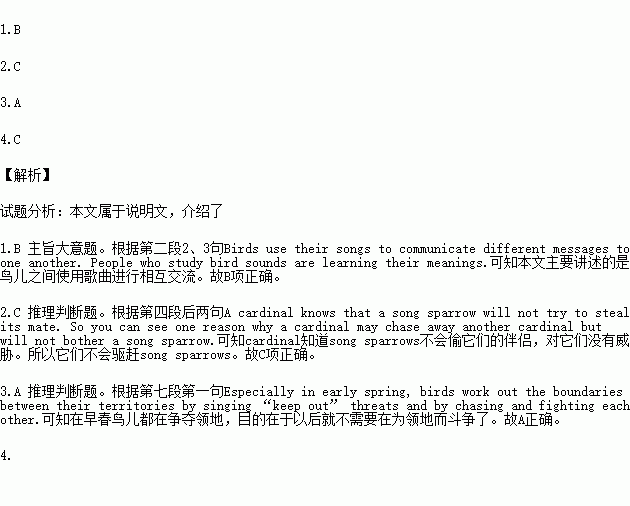题目内容
“Keep out or I’ll chase you out! This is my property!”
You hear this every spring. It is a long musical sound --- a bird song! Birds use their songs to communicate different messages to one another. People who study bird sounds are learning their meanings.
Usually it is the male that sings. Early in spring he sings to say that he has picked out a piece of property. He sings to attract a female of his same kind. Together they will raise a family in his territory (领地). He sings to tell all other birds of his kind to keep out.
Each kind of bird has its own type of song. Cardinals sing something that sounds a little like “What cheer, cheer, cheer.” Towhees sing, “Drink your tea.”
Most of the time, birds pay attention only to the songs of birds of their own kind. Cardinals answer cardinals, and song sparrows answer song sparrows. A cardinal knows that a song sparrow will not try to steal its mate. So you can see one reason why a cardinal may chase away another cardinal but will not bother a song sparrow.
Most different kinds of birds eat different things. To find enough to eat, a bird needs a big piece of land to search in. Many kinds of birds have some ways of dividing up the land into territories. Song sparrows, cardinals ovenbirds, and white-throated sparrows are some of the birds that have territorial systems.
Especially in early spring, birds work out the boundaries between their territories by singing “keep out” threats and by chasing and fighting each other. The birds continue singing to tell females that they have set up territories. Neighboring birds seem to agree that there are make believe fences between their pieces of property. Then they do not have to waste energy chasing each other instead of taking care of their young.
Scientists guessed that some birds could recognize their neighbors by small differences in their songs. Two scientists who studied white-throated sparrows found that these birds can even tell the difference between songs of individual birds of their own kind. White-throated sparrows have songs that seem to say “I’m your neighbor” or “I’m a stranger” or “I’m your neighbor to the west.” Other kinds of birds could tell neighbors from strangers by their songs, too.
1.What is the article mainly about?
A. How birds build up their territories.
B. How birds sing to communicate.
C. How male birds chase after females.
D. How scientists recognize birds’ songs.
2.A cardinal may not keep a song sparrow out of its territory because ________.
A. they sing different songs
B. they have separate territories
C. it feels no threat from a song sparrow
D. song sparrows are friendly to other birds
3.Some birds have their own territorial systems so that ________.
A. they don’t need to fight or chase each other
B. they often work together against threats
C. they build up fences to protect their property
D. they find a big piece of land to search for food
4.What can we conclude from the article?
A. Male birds use their songs to communicate more than females.
B. Scientists have learned the meanings of all white-throated sparrows sing.
C Not all birds can recognize their neighbors by small differences in their songs.
D. White-throated sparrows are the smartest birds the scientists ever found.
 数学奥赛暑假天天练南京大学出版社系列答案
数学奥赛暑假天天练南京大学出版社系列答案
